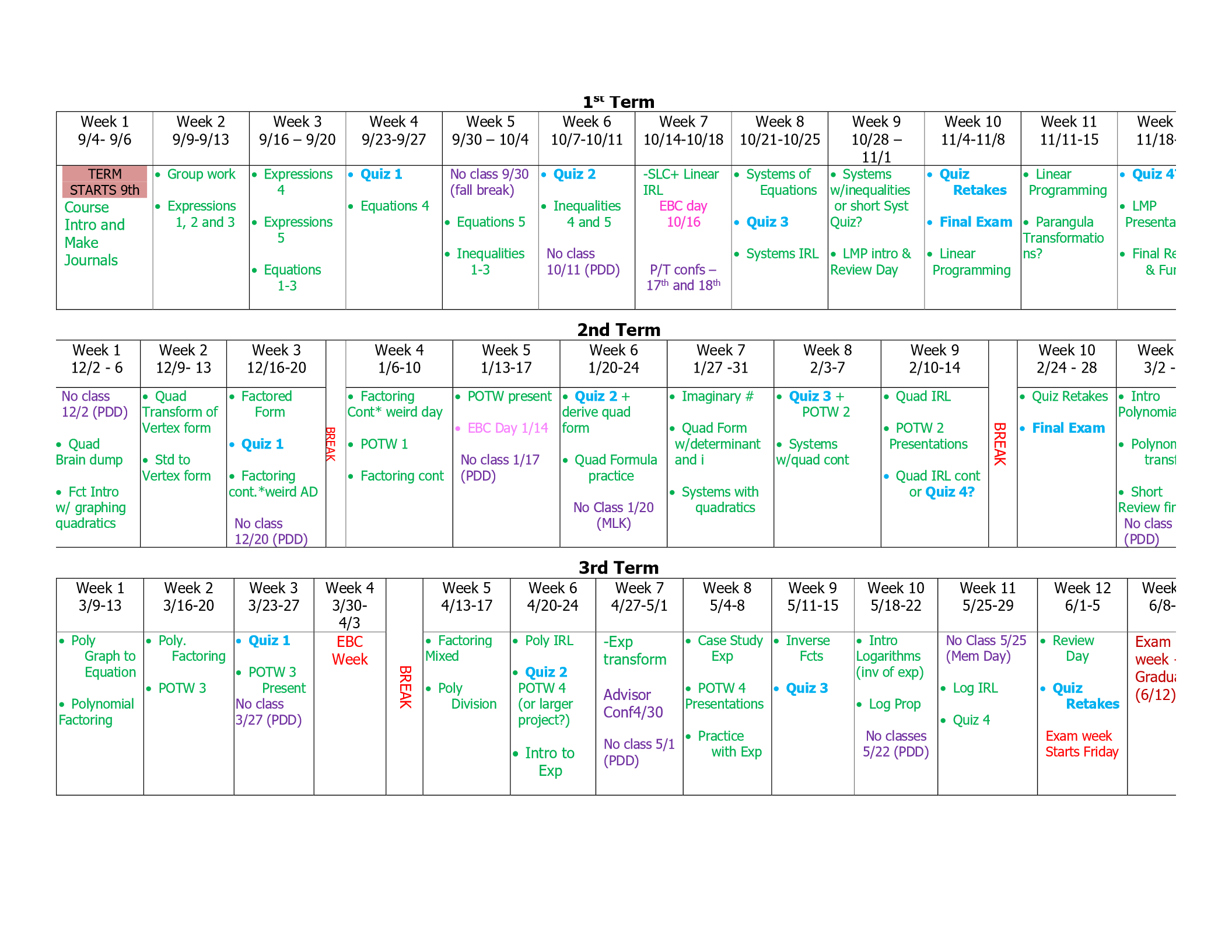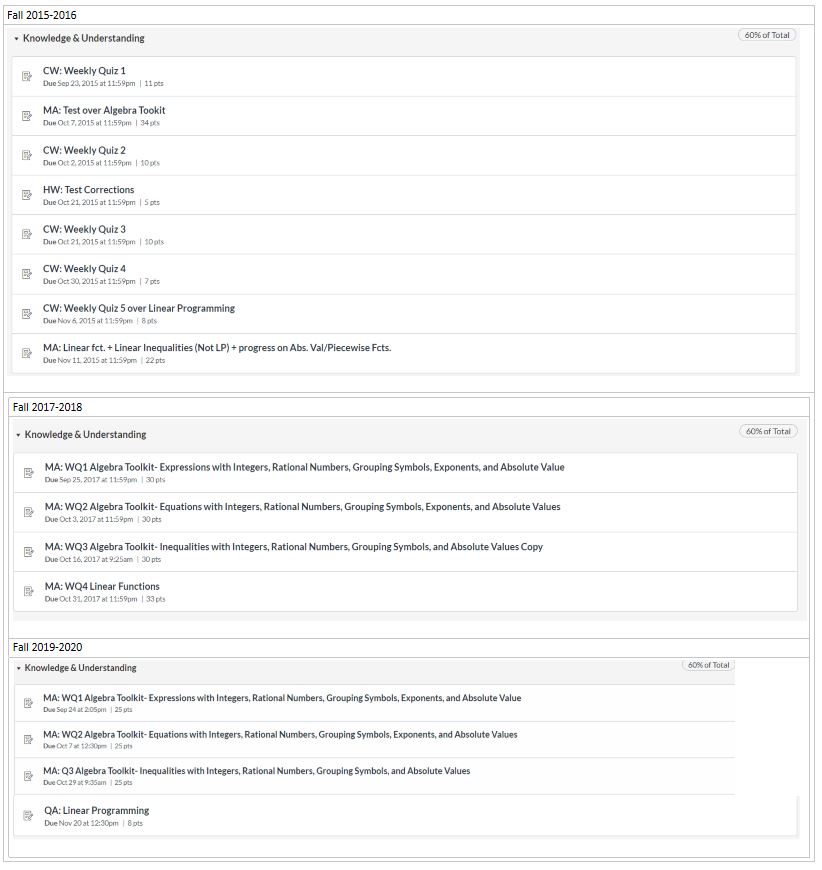(1) designs major assessments that reflect course outcomes and posts them at the start of each trimester
(2) designs assignments to be graded and returned in a feedback cycle of seven calendar days
(3) ensures the number of assignments in each course is neither excessive nor deficient — providing appropriate time for quality student performance and meaningful teacher feedback
(1) designs major assessments that reflect course outcomes and posts them at the start of each trimester
|
When I first started |
Current practice |
Future goals |
|
Built as I went. Not posted at start of trimester because not established practice |
Having taught courses before allows for me to have a better grasp on calendaring assessments. And consequently, feel better posting them at the start of the trimester. |
I feel comfortable with traditional assessments – tests/quizzes. Want to do better in the project space. Want more assignments that give students authority to be creative and possess ownership of the math they’re working with as opposed to feeling like they’re just copying/duplicating steps. |
(9/2015-11/2019) I’ve included snippets below of my Algebra 2 Canvas pages from the Fall Trimester where the Major Assessments live. As you can see, the Major Assignments have reduced in quantity over time. Additionally, what is posted includes more detailed information about the course outcomes.
(2) designs assignments to be graded and returned in a feedback cycle of seven calendar days
Grading is a real challenge for me. It’s a part of teaching that I don’t look forward to – unless I’ve given the students an assignment where they’re exercising creativity. I don’t feel a student should be assessed for what they know about a concept until they’ve had some time to learn it and practice it. The more we can encourage students to make mistakes, the more they have to learn. (And yes, experiencing successes along the way is important too!) So designing a HW system that reduces the stakes for accuracy – and is considerate of different speeds in solving – was important to me. Therefore, the homework in my classes have shifted to be more focused to work for time and the answer key is provided. Quizzes and exams are fairly traditional.
|
When I first started: |
Current practice |
Future goals |
|
Quizzes and tests always had an urgency that doesn’t make this challenging. It’s the daily homework where I would fall behind. Given I didn’t grade hw for accuracy or for completing specific problems (except for year 1) this means the responsibility is more on them. I’ve shared answer keys- so they can get that feedback in the moment. As opposed to trying something and submitting it and then waiting to find out. |
Quizzes/tests going well. Even in online format I’ve been happy with my evolution to be able to give kids quick, meaningful feedback. Still can be challenging because the HW is completion based. Do well to indicate if assignment is missing but not giving much feedback beyond that. Timed system to work on problems helps address processing speed issues, allows for tuning difficulty to ability, and closes feedback loops quicker than requiring everyone to complete a specific problem set. But it also increases cognitive load as students have to make choice and it’s not perfect for students with processing speed challenges as they can fall further behind if they’re not putting in the work and staying on top of the assignments.
|
Want to reach diversity of learners as best as I can. So it’s finding that balance of allowing for flexibility while providing enough structure for students to succeed. ALEKS trial in Algebra 2 this year seems to have potential but will need to invest more time and consistency for the students to get more out of it next year. |
(9/2017-11/2019) From Student experience surveys 2017, 2018, 2019:
|
My work is returned to me in a timely manner (within a week) |
Average: 3.1004 |
(3) ensures the number of assignments in each course is neither excessive nor deficient — providing appropriate time for quality student performance and meaningful teacher feedback
| When I first started: | Current practice | Future goals |
| Focused on giving daily homework as that’s always been a cornerstone of math instruction- getting that practice to reinforce the skill. Then was sure to include assessments on material. Started year 1 with small quizzes (1-2 sections) then unit test and trimester final. Have evolved to larger quizzes (3-4 sections) and trimester final.
Found that the mixing of concepts forces students to have more mastery of the material. The small quizzes would give students a false sense of confidence when going into the unit test. Because they hadn’t worked with the material much outside the hw and little quiz, they didn’t revisit/retain it well before unit test. By having larger quizzes cover more topics, students need to be more prepared and have more time to get ready. |
Continued work of having larger quizzes over 3-4 sections of material.
Created mapping document- when co-teaching with Duffy last year to help with seeing the pressure points of the course and ensure balance.
New reflection: I thought I was doing ok with providing balance- but given transition to EPS remote. Feel as if maybe assignments could be trimmed a little further. Hearing how much more balance students have had in their lives has been great! |
Hope I can continue to keep student work load in mind and that we can have this conversation as a community.
I know although we can do our part, families will work in their own ways. But I think we can make strides in helping provide life balance for students by considering what we assign. Where this gets tricky is the pieces like studying for a test, or a project, or thinking creatively, where the demands are less predictable. |
(6/2019) Algebra 2 Year-Plan document made with Anne at the end of 2019 school year.

Good work